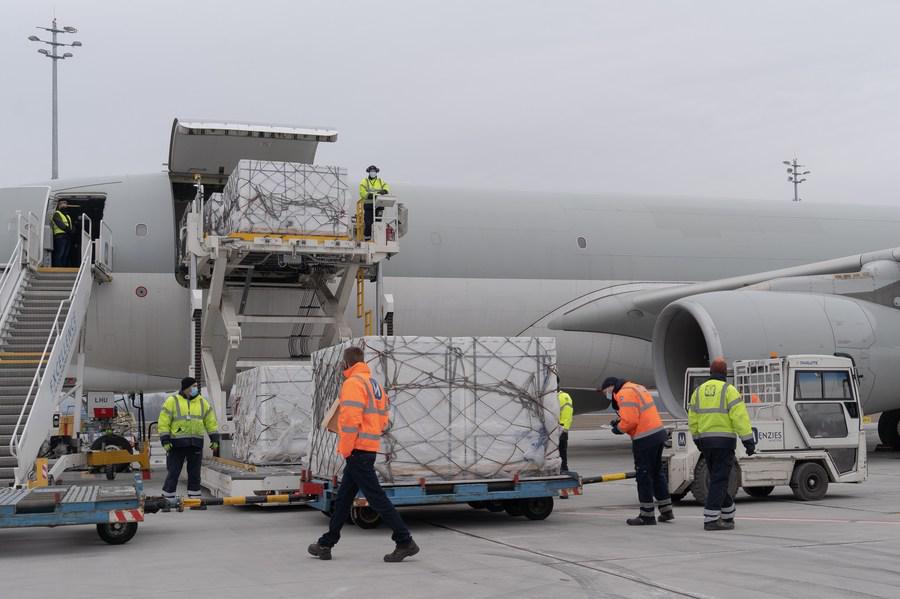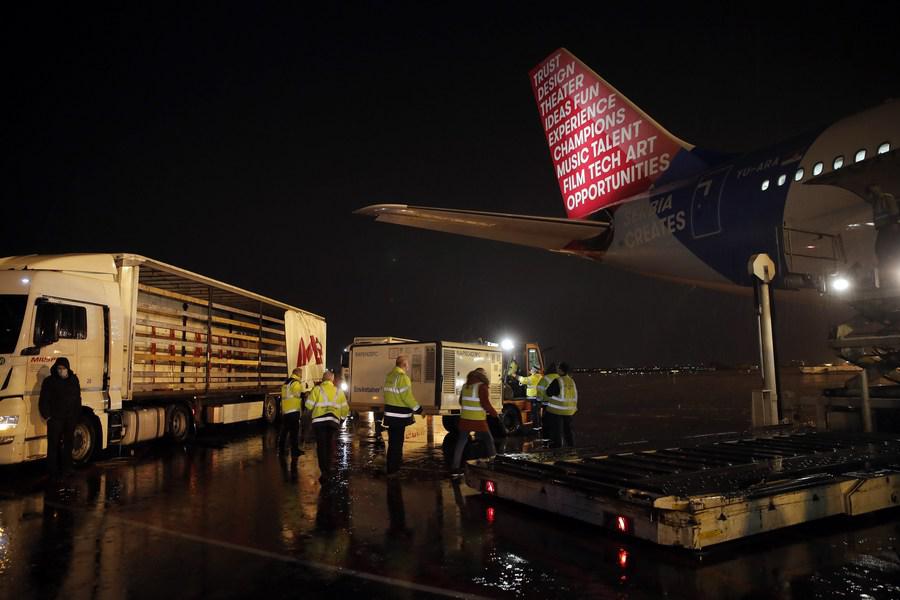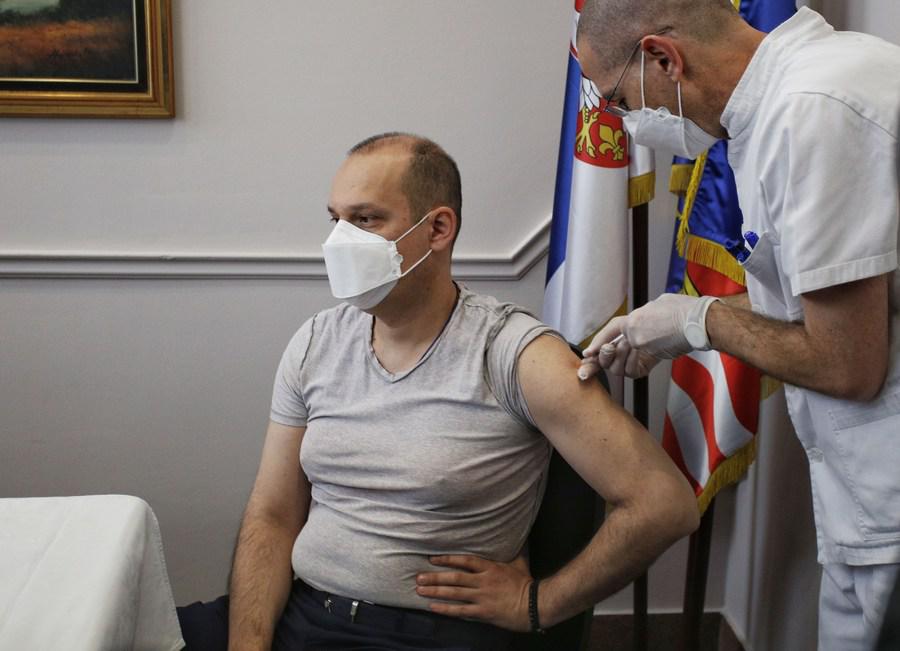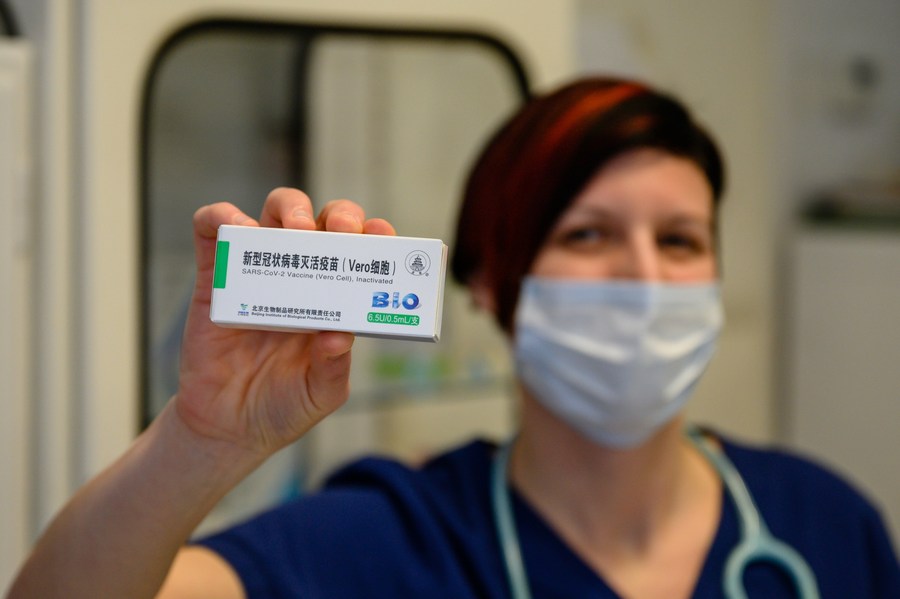

-- Two weeks after Hungary announced that it had reached a deal with China's Sinopharm, the first batch of Sinopharm vaccine arrived in Budapest on Feb. 16, which will enable a mass immunization of 2.5 million people.
-- Bulgaria is receiving only 40 percent of what it had expected of the Oxford-AstraZeneca vaccine. "We do not need your courtesy. We need vaccines," said Health Minister Kostadin Angelov.
-- An EU summit on Thursday stressed the need to urgently accelerate the authorization, production and distribution of vaccines, as well as inoculation.
BRUSSELS, Feb. 27 (Xinhua) -- As a looming third wave of the COVID-19 pandemic highlights the vaccine supply shortfalls in Europe, Hungary joined Serbia to launch mass inoculation with China's Sinopharm COVID-19 vaccine earlier this week.
To ease both citizens' impatience with the slow rollout of vaccinations and the world's urgent need of a global response to the pandemic, some European countries are turning to the East while the European Union (EU) strives to scale up production and reaffirms solidarity with third-party countries.
CHINESE VACCINE
"Today is an important day because (on) this day we are starting to vaccinate with Chinese vaccines," Hungarian Prime Minister Viktor Orban said Wednesday in a video message on his Facebook page.

Staff members transfer the first batch of China's Sinopharm COVID-19 vaccine purchased by Hungary at the Liszt Ferenc International Airport in Budapest, Hungary, Feb. 16, 2021. (Photo by Attila Volgyi/Xinhua)
Hungary currently has stocks of COVID-19 vaccines from five producers. Two weeks after the country announced that it had reached a deal with China's Sinopharm, the first batch of Sinopharm vaccine arrived in Budapest on Feb. 16, which will enable a mass immunization of 2.5 million people.
"We are the first country in the European Union that uses Sinopharm vaccine. We try to save lives and preserve the economy, and we are fighting together with our Chinese friends against COVID-19," Tamas Menczer, state secretary from the Hungarian Ministry of Foreign Affairs and Trade, told Xinhua when receiving the shipment.
In Serbia, where a second shipment of Chinese vaccine arrived on Feb. 10, the Sinopharm vaccine is welcomed with full trust, and the early inoculation is seen as an opportunity, according to Ivona Ladjevac, head of the center for the Belt and Road Initiative at the Institute of International Politics and Economics in Serbia.

Serbian President Aleksandar Vucic (C) and China's ambassador to Serbia Chen Bo (L) welcome the shipment of China's Sinopharm inactivated coronavirus vaccines at the Belgrade Airport, Serbia, Jan. 16, 2021. (Photo by Predrag Milosavljevic/Xinhua)
"We should use this opportunity," said Ladjevac. "Serbia can do something like Israel, the first country that will finish this mass vaccination... We can achieve something like that too."
Under the state's mass inoculation drive, Serbian authorities have approved four vaccines, respectively developed by Pfizer-BioNTech, Oxford-AstraZeneca, China's Sinopharm and Russia's Sputnik V.
Serbian President Aleksandar Vucic told Xinhua that most people in his country are vaccinated with the Sinopharm vaccine.
"People here are very satisfied and we are very proud that we succeeded in delivering such good things for the better health of our people and for the future of this country," he said.
A shipment of Sinopharm vaccines will arrive in Bosnia and Herzegovina (BiH) soon too, as ordered on Feb. 8 by Republika Srpska (RS), one of BiH's two entities, Minister of Health and Social Welfare of RS Alen Seranic told Xinhua.

Workers unload a container of China's Sinopharm vaccines at the Belgrade Airport, Serbia, Feb. 10, 2021. (Photo by Predrag Milosavljevic/Xinhua)
"Based on other countries' experiences, where Chinese vaccines have already been approved, we decided that we also need to acquire a certain number of vaccines from China," Seranic said. "We already ordered vaccines for 20 percent of our population."
SUPPLY SHORTAGE
BiH has acquired vaccines through the COVAX mechanism, the World Health Organization (WHO)-led global initiative aimed at ensuring rapid and equitable access to COVID-19 vaccines, and from the EU.
It is now urging all relevant international institutions to start vaccine delivery instead of prolonging it with new requirements, the Ministry of Civil Affairs of BiH said on Wednesday.
Delivery of vaccines to BiH through the COVAX Facility was initially due to start by the end of January and later prolonged to mid-February. And the ministry said in a statement that BiH has provided refrigerators to receive, transport, and distribute more than 1.2 million doses of Pfizer vaccines, in line with the ultra-cold chain procedure.

A family doctor administers a dose of China's Sinopharm COVID-19 vaccine to a man in Nagykata, Hungary on Feb. 24, 2021. (Tibor Illyes/MTI via Xinhua)
Meanwhile in Bulgaria, the NOVA television reported on Wednesday evening that the health ministry has accused AstraZeneca of delaying vaccine supplies, which was later confirmed on Thursday by Health Minister Kostadin Angelov at his regular weekly press conference.
Amid the "race against the virus, we were extremely unpleasantly surprised by another non-compliance with the agreement by the company," Angelov said.
By the end of August, Bulgaria booked 4,518,323 doses of the Oxford-AstraZeneca vaccine. The country has received 117,600 doses by Feb. 26. "The quantity was reduced to 40 percent of those expected," Angelov said.
"Within three days we have had serious talks with the supplier company at various levels," he said. "We received only one letter stating that 'the production of vaccines is a process of a high degree of technical complexity' and 'we expect to be able to deliver vaccines to Bulgaria.'"
"We do not need your courtesy. We need vaccines," Angelov added.

Serbian Health Minister Zlatibor Loncar receives a dose of Chinese COVID-19 vaccine in Belgrade, Serbia, on Jan. 19, 2021. (Nikola Andjic/Tanjug/Handout via Xinhua)
FASTER PACE
An EU summit on Thursday stressed the need to urgently accelerate the authorization, production and distribution of vaccines, as well as inoculation.
To date, 51.5 million doses have so far been delivered across the EU and 29.17 million administered, with about 5 percent of citizens having had their first dose, according to data released by the EU.
With speeding up the production and delivery of vaccines being the top priority, the EU chief encouraged the executive to work with medical industries to identify bottlenecks, guarantee supply chains and scale up production, and urged pharmaceutical giants to honor their commitment.
Besides a long wait for increased production to curb supply fluctuations, the world also faces a "catastrophic moral failure" because of unequal COVID-19 vaccine policies, World Health Organization Director-General Tedros Adhanom Ghebreyesus has warned, adding it is not fair for "younger, healthy people in richer countries to get injections before vulnerable people in poorer ones."

European Council President Charles Michel (R) and European Commission President Ursula von der Leyen attend a press conference after the first day of a virtual summit in Brussels, Belgium, on Feb. 25, 2021. Leaders of the European Union (EU) called for an accelerated production and delivery of COVID-19 vaccines late on Thursday as the bloc is struggling with supply shortfalls. (European Union/Handout via Xinhua)
European Commission President Von der Leyen admitted on Thursday that, though the EU has announced a doubling of its support to COVAX to 1 billion euros, "vaccine in kind is desperately needed" and EU member states are encouraged to organize donations of vaccines to third-party countries.
Last week, French President Emmanuel Macron made similar comments when he proposed that Western countries transfer 3 to 5 percent of their stock of COVID-19 vaccines to Africa -- a proposal firmly rejected by Washington which said, "the U.S. will not donate any coronavirus vaccine doses to developing countries until there is a plentiful supply of jabs in the U.S.," the Financial Times reported.
The French president called for international efforts to ensure equal access to vaccines against COVID-19, especially in Africa. For him, Chinese and Russian vaccines are necessary for the world to win the "war" against this pandemic.
In a telephone conversation with Chinese President Xi Jinping on Thursday, Macron said France appreciates China's positive contribution to international cooperation against the pandemic, especially in helping other countries obtain vaccines at a faster pace, adding that he hopes to strengthen cooperation with China in this regard.

A family doctor shows a box of China's Sinopharm COVID-19 vaccine in Varoslod, Hungary on Feb. 24, 2021. (Tamas Vasvari/MTI via Xinhua)
According to media reports, so far, China has provided vaccine assistance to 53 developing countries in need, and exported vaccines to 22 countries. It has also decided to provide 10 million vaccine doses to multilateral vaccine alliance COVAX to meet the urgent needs of developing countries, many of which are in Africa.

 Award-winning photos show poverty reduction achievements in NE China's Jilin province
Award-winning photos show poverty reduction achievements in NE China's Jilin province People dance to greet advent of New Year in Ameiqituo Town, Guizhou
People dance to greet advent of New Year in Ameiqituo Town, Guizhou Fire brigade in Shanghai holds group wedding
Fire brigade in Shanghai holds group wedding Tourists enjoy ice sculptures in Datan Town, north China
Tourists enjoy ice sculptures in Datan Town, north China Sunset scenery of Dayan Pagoda in Xi'an
Sunset scenery of Dayan Pagoda in Xi'an Tourists have fun at scenic spot in Nanlong Town, NW China
Tourists have fun at scenic spot in Nanlong Town, NW China Harbin attracts tourists by making best use of ice in winter
Harbin attracts tourists by making best use of ice in winter In pics: FIS Alpine Ski Women's World Cup Slalom
In pics: FIS Alpine Ski Women's World Cup Slalom Black-necked cranes rest at reservoir in Lhunzhub County, Lhasa
Black-necked cranes rest at reservoir in Lhunzhub County, Lhasa China's FAST telescope will be available to foreign scientists in April
China's FAST telescope will be available to foreign scientists in April